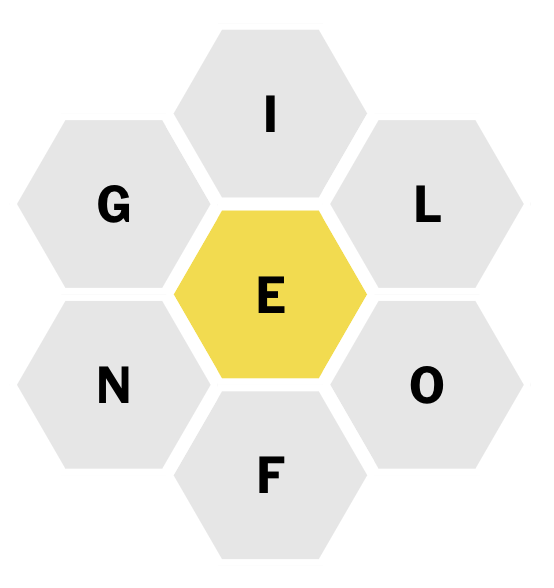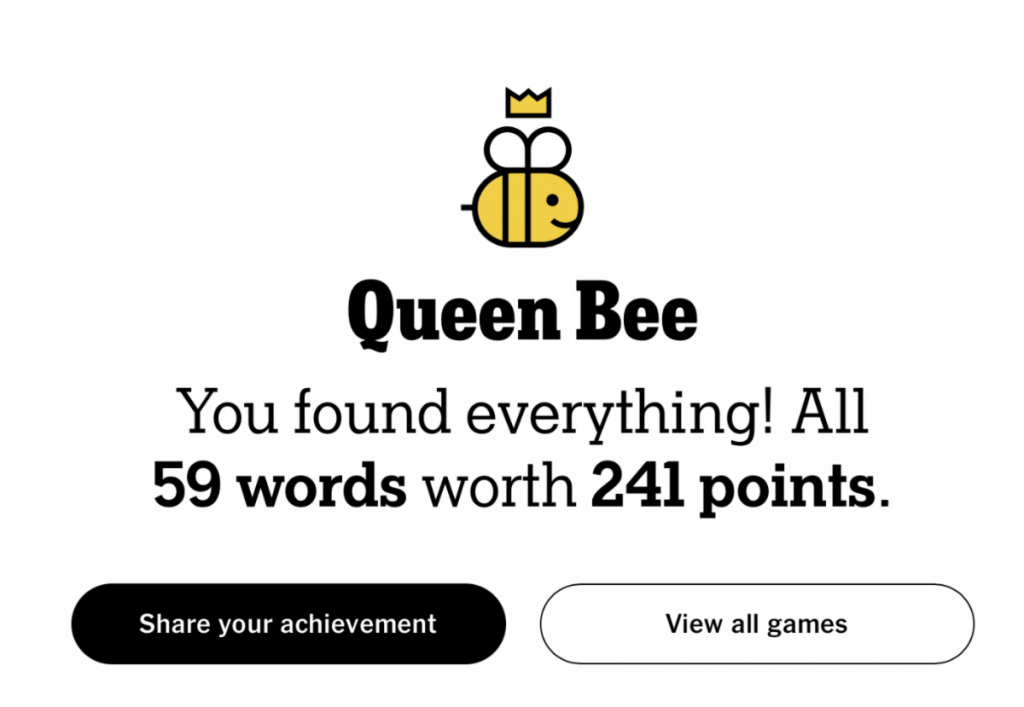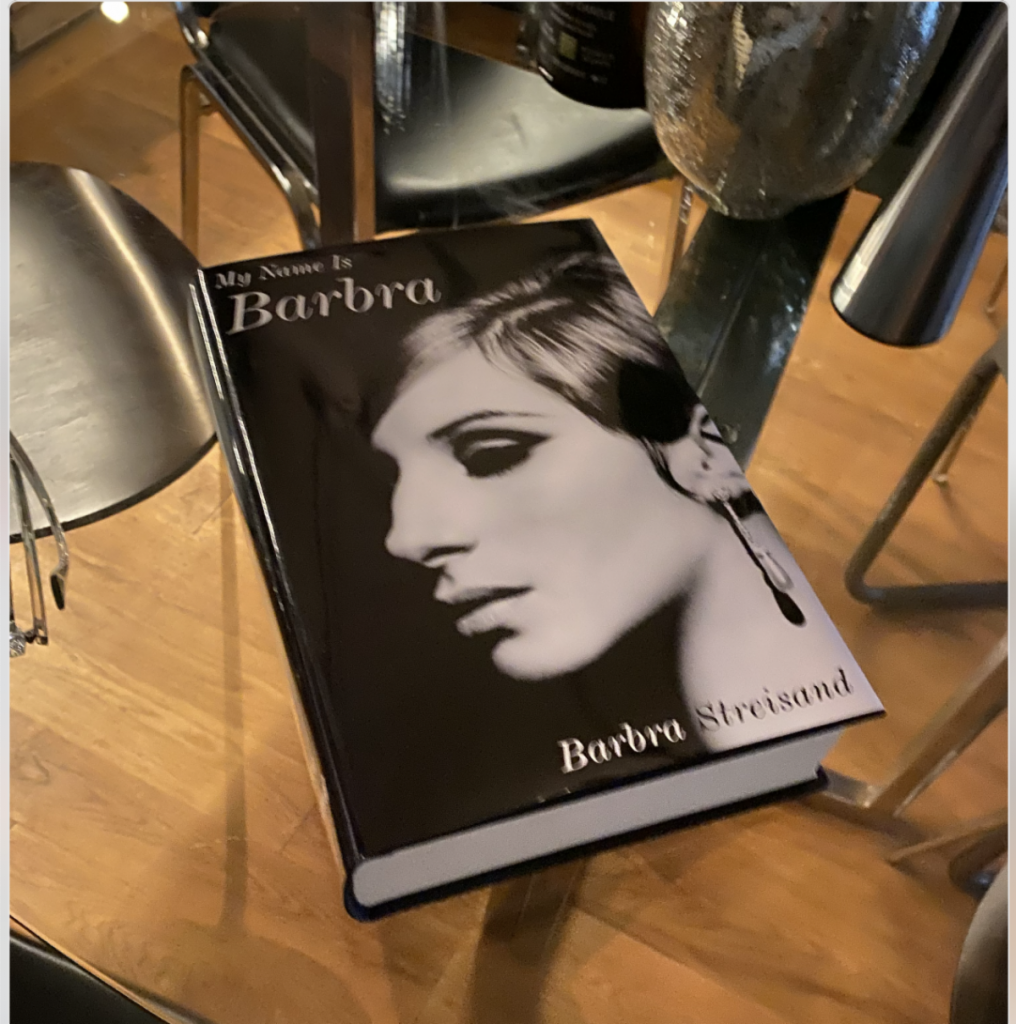It’s definitely one of my more time-consuming but healthier obsessions.
Namely, my daily deep dive each morning into the New York Times’ puzzle section.
My routine is as follows.
I start with the mini-puzzle.
Then I tackle Wordle, the new Connections puzzle, then the regular puzzle, and, of course, the Spelling Bee.
For the uninitiated, the Spelling Bee requires that you find as words as possible from the given seven letters.
The rules are simple:
• Words must be at least four letters long
• Letters can be repeated, and
• Each word must contain the highlighted central letter.
And there’s always at least one pangram which contains all the letters.
Here’s the puzzle from today:

Besides offering a hints section, the Spelling Bee also has a link for complaints, so that you can write in to report that a valid word has not been included.
To be honest, although I wrote in this morning, I was less frustrated by a word’s omission than I was delighted by the following synchronicity.
The omitted word I reported was “logline”––which Merriam-Webster defines as “a simple synopsis of a screenplay, film, novel, etc. that is used for pitching.”
The synchronicity is that logline was also the word at the very top of my handwritten notes from last night for this newsletter, dashed off while I was re-reading chapter one in Blake Snyder’ Save The Cat!

Snyder is quite passionate about loglines.
Crafting that perfect summary as your first step and expanding from there is perhaps the unifying principle of his book about Storytelling, the theme I’ve chosen for this month’s new meditation HERE.
Here’s the rub…
Even though the dictionary includes “logline” and I personally feel it’s made its way into mainstream culture, sadly the New York Times does not recognize it as a legitimate word to add to your score.
Nonetheless, as you can see below, I’m proud to say I ultimately triumphed, capturing all the “approved” words.

One of the hardest things for writers––perhaps especially the most talented––is crafting their logline.
That’s because it’s incredibly hard to summarize everything you want to say in a 2-hour movie or a 300-page novel in a short phrase or two.
Indeed, if you could have send it all in a single sentence, you would have spared yourself endless hours of labor!
Snyder’s no-nonsense point, however, is that until you have a killer logline––a precise and compelling way into your story––you’re more or less creatively adrift.
In his method, rather than pouring out everything you have to say on the page and then pairing it down, you start by crafting your summary, refining and testing it as much as possible.
This kind of focused minimalism is often astonishingly difficult to achieve.
I’m always reminded of the lines attributed to Blaise Pascal:
“I would have written a shorter letter,
but I did not have the time.”

The first and most essential thing about any logline, is it answers the question your friends ask when you suggest a movie they haven’t heard of:
“What’s it about?”
Yet to be successful it must do more than that.
Whether it’s a comedy or a drama, according to Snyder, there’s an even more important element:
Namely, your logline must contain some kind of ironic hook, some quirky set-up of challenges and obstacles, that draws us in.
(As a cheesy example, “Die Hard in a Bowling Alley.”)
As he writes, “A good logline must be emotionally intriguing, like an itch you have to scratch.”

Speaking of summarizing your life story…
Recently, I was a guest for the second time on my wonderful and wise friend Joan Sorkin’s podcast, The Prosperity Show.
I love talking to Joan.
It’s always a lively and deep and laughter-filled conversation.
This time, we dove more directly into my life story and how I came to be sharing the things I’m teaching.
You can listen to it HERE.
Afterwards, I also found it delightful to read the show notes, the highlights of our conversational narrative.
I certainly remembered the gist of what we talked about, but I loved how Joan encapsulated those moments for us in ways I could never have done for myself.
Indeed, if you think that writing a logline for a novel or screenplay is tough, I invite you to try writing one for your own life.
(And pretty soon, I’m going to formalize that invitation.)

And, speaking further of telling one’s life story.
Barbra Streisand’s long-await autobiography arrived in my mailroom on Tuesday.
It was tempting to cancel everything for a week and lose myself in her narrative.
Coming in at a whopping 970 pages, this is definitely a deep dive.
Clearly galaxies away from crafting her logline, Barbra didn’t want to leave anything out.
In fact, although she was supposed to deliver the manuscript to her publisher in two years, she took an entire decade to finish her book.
My only complaint thus far…
I wish it were longer!

Here’s what Sam Ezersky (technically the Times’ auto-responder) wrote back about my Spelling Bee complaint:
“In fairness to our wide-ranging audience, Spelling Bee generally avoids terms that are hyper-specific to any background or professional field, such as terms that might be familiar to, say, a physician or geologist, but not people outside of that area of expertise.”
And yet, as one writer commented HERE, the puzzle does give credit for such “general audience” words as attar, hondo, tori, torii, nene, and abbacy.
Since I’m sensing and seeing so many signs of a Zeitgeist refocusing on Storytelling, I’m confident that soon “logline” will join those verbal gems.

As I said last week, what interests me most about storytelling is how we use it constantly to shape and live our lives.
In fact, I’m in the beginning stages of developing a workshop or maybe even a course on the topic.
And I wondering if Snyder’s method of starting with the logline, making sure it has some ironic and emotional zing to it, might be a powerful way of reframing our own narratives.
In a way, we present these loglines whenever we introduce ourselves, yet sadly often omitting the twist that makes us most interesting.
For example:
I’m a microbiologist (who’s obsessed with astrology).
I work in high-powered finance(but my secret life as a DJ in Berlin pays me more.)
I’m an Assistant District Attorney (and my partner is just as passionate about criminal defense).
Those are all stories I’d be curious to learn more about.
In any case, crafting and revising our narrative is a continuous process.
In a book I really admire, The Order of Time, by the acclaimed theoretical physicist and author Carlo Rovelli, he summarizes this phenomenon:
“I am this long, ongoing novel.”
And the pangram for today’s puzzle reflects this as well.
(Another synchronicity…?)
You see, the single word you can make from all seven of those letters is LIFELONG.
Truthfully, I can’t think of a more fitting adjective to capture this transcendently human the process of constantly telling and retelling our stories, loglines and beyond.

